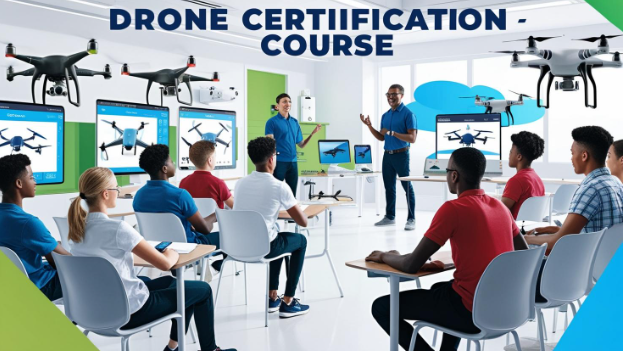
In recent years, the world has witnessed a significant rise in the popularity of drones, not only as tools for photography and recreation but also as essential instruments in various industries. As drones continue to revolutionize fields like agriculture, construction, and logistics, many aspiring enthusiasts and professionals are eager to tap into this high-flying potential. Enter drone courses—the ultimate starting point for anyone ready to explore the boundless possibilities of unmanned aerial systems.
Unlocking the World of Drones Through Comprehensive Education
The increasing availability and affordability of drones have made them accessible to more people than ever before. However, piloting a drone effectively and safely requires more than just purchasing the latest model. Drone courses designed for beginners provide structured learning experiences that cover everything from basic flight skills to the legal and ethical considerations of drone usage.
Through these courses, participants gain an understanding of aerodynamics, flight mechanics, and navigational skills, ensuring they are well-prepared to handle various flight scenarios. The inclusion of modules on airspace regulations, safety protocols, and troubleshooting equips learners with the knowledge needed to fly responsibly and avoid potential hazards.
Why Structured Learning Matters in the Drone Space
While it might be tempting to rely on online tutorials or informal learning, structured drone courses offer a more comprehensive approach. These courses often include hands-on training with real drones, simulations, and assessments to track progress. This method ensures that participants not only understand the theoretical concepts but also develop practical skills that translate into safe and effective drone operations.
Moreover, many drone courses are tailored to align with local and international aviation regulations, ensuring compliance with the rules and standards governing drone use. For beginners, this guidance is invaluable, as it helps avoid common pitfalls and sets the stage for more advanced learning opportunities.
The Connection Between Drones and Other Emerging Technologies
Interestingly, the integration of drone technology into various industries has created exciting cross-disciplinary opportunities. For instance, hydroponics education programs have started incorporating drone technology into their curriculum to demonstrate how aerial data collection can optimize crop management and increase agricultural productivity. By combining drone technology with hydroponic systems, students gain a holistic understanding of how innovative technologies can enhance sustainability and efficiency in agriculture.
Similarly, educators are increasingly adopting drones classroom kit solutions to provide students with interactive, hands-on learning experiences. These kits often include programmable drones, allowing learners to engage with both the hardware and software aspects of drone technology. By incorporating drones into classroom settings, educators can spark interest in STEM subjects while teaching valuable skills that are applicable to numerous industries.
Expanding Horizons with Specialized Learning Paths
Beyond the basics, many drone courses offer specialized modules or tracks focusing on specific industries. For instance, courses designed for aspiring aerial photographers cover topics such as camera settings, framing, and post-production editing. Those interested in using drones for surveying or mapping might delve into geographic information systems (GIS) and data interpretation.
This diversification ensures that learners can tailor their educational journey to match their personal interests and career goals. With the right course, a beginner can progress from mastering the fundamentals to becoming a specialist in a niche field like drone cinematography, precision agriculture, or infrastructure inspection.
The Role of Certifications and Credentials
Completing a recognized drone course not only builds skills but also provides participants with certifications that demonstrate their competency. These credentials are increasingly valuable in professional settings, where employers seek certified drone operators who can contribute to projects safely and effectively. Certification can also serve as a stepping stone to obtaining more advanced licenses required for commercial drone operations in many jurisdictions.
Furthermore, holding a certification boosts credibility for freelancers and entrepreneurs looking to offer drone services. It signals a commitment to professionalism and a solid understanding of industry standards, which can help build trust with clients and partners.
Looking Ahead: The Future of Drone Education
As drone technology continues to evolve, drone courses will play an increasingly vital role in shaping the future workforce. Educational institutions and training providers are expanding their offerings, incorporating cutting-edge technologies like artificial intelligence and machine learning into their curricula. These advancements will further enrich the learning experience, preparing drone operators for a dynamic and ever-changing industry landscape.
Moreover, as drones become integral to sectors such as emergency response, environmental monitoring, and urban planning, the demand for skilled operators will only grow. By investing in comprehensive drone education now, individuals can position themselves at the forefront of this exciting technological revolution.
Conclusion
In a world where technology is advancing at an unprecedented pace, drone courses offer a structured and insightful gateway to mastering drone operations. From foundational skills to industry-specific knowledge, these courses equip learners with the tools needed to succeed in both recreational and professional drone use. With the integration of hydroponics education programs and drones classroom kit solutions, drone education is becoming more dynamic and interdisciplinary, preparing participants for a range of exciting opportunities.

Most Commented Posts